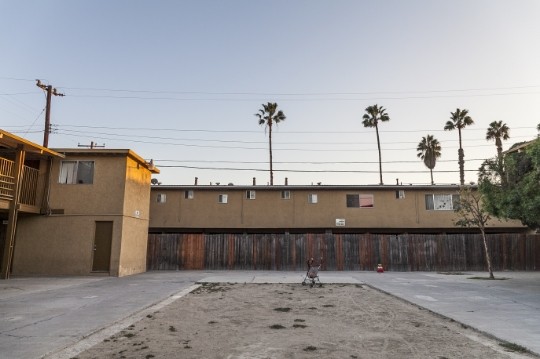
Anaheim City Councilwoman Kris Murray is usually known for being a cold technocrat (as well as for being a 2013 OC Scariest People inductee), so it was odd when she spoke with passion about squalor. “To the slumlords who are trying to operate in our city, we want you to get out,” Murray warned during an August Quality Rental Housing program workshop. “We are coming!”
The program has been a point of pride for the councilwoman, with her allies on the dais giving giddy props. But after meeting with rental associations since the initial workshop, the final version of Murray's anti-slumlord crusade–slated for a vote at Tuesday's City Council meeting–is really just an effort to boot low-income residents under the guise of addressing overcrowding. And not giving an actual shit about the poor, of course!
]
Anaheim has unsuccessfully tried to target slumlords numerous times in the past, stretching as far back as 1993 under then-Code Enforcement head John Poole. Rental associations and landlords have cried foul over previous proposals, but Murray's Quality Rental Housing Program is so nonthreatening to them now that it seems poised to pass without any complaints.
With roots dating back to a few months after the 2012 riots, when a number of department heads brainstormed a “Blight Eradication Program,” the plan originally called for a flat enrollment fee for apartment owners of just $16 per-unit annually. This would help fund the beefing up of Code Enforcement with six new hires under a proposal by Poole himself, who latched on to the discussion as a consultant.
That didn't sit well with rental associations or apartment owners. “My initial reaction is that, ideally, responsible landlords should not have to pay for those that are not,” wrote Mike Balsamo of the OC chapter of the influential Building Industry Association in an email to Planning Department head Sheri Vander Dussen that was obtained by the Weekly. Meanwhile, an anonymous letter sent to council members by apartment owners took issue with the program, even taking time to ridicule Murray about her much-ballyhooed visit to a vermin-infested tenement. “The only reason this has come about is because of two council members, Kris Murray and Gail Eastman,” the letter reads. “They went with staff from Code Enforcement to do an inspection because it was someone from the Colony area's friends house, NOT an apartment.”
The baseline enrollment fee vanished by the time the Quality Rental Housing Program returned for a follow-up workshop in November. The funding, as it stands, will now come from the Planning Department's budget, albeit with three fewer hires. Council members thanked residents for their input at that workshop, but that was merely a shout-out to the mostly white, well-to-do Anaheim Neighborhood Association (ANA)–and not those who actually live in densely populated barrios, who weren't in attendance that day.
A Management Practices Questionnaire will be sent to owners as part of Murray's proposal and is heavily focused on occupancy restrictions. Among the questions: Does your rental agreement . . . state the maximum number of occupants permitted in the unit? Are all adult occupants of each apartment named on the rental agreement? Should you find occupants living in the unit who are not listed on the rental agreement for that unit, what action do you take?
Actual questions posed to residents? None.
[

If the questionnaire isn't completed or returned in 60 days, and if owners haven't adopted occupancy regulations, the city can conduct inspections of the complex–including going inside rental units–at an agreed-upon time with owners and affected tenants.
“When rental buildings are not properly maintained, they generally create negative impacts on the surrounding neighborhoods and property values,” reads the sample letter set to go out to owners. “In addition, the quality of life for households living in these units is poor.”
For the scores of working-class Latino immigrants affected, the focus of the Quality Rental Housing Program is clear. Tenants are not empowered by rent control or any other such forms of protection in the program, meaning if a landlord gets slammed, it's the tenants who'll suffer. “The cost burden of rent is very overwhelming for a family,” says Lucero Ramos, an Anaheim resident who shares an apartment with five other relatives. Her parents work, and most of their earnings go toward rent. More spacious accommodations are simply unaffordable. “We all needed our own space growing up, but we couldn't have that with one bedroom and one bathroom.”
Growing up in different West Side barrios, rapper Skandalouz of the Anaheim group Sacred Blasphemy poetically folded his experiences into his lyrics. His side of town (where the Weekly profiled poor living conditions in the Brownwood barrio last year) is where the program will begin, then go from west to east over the next five years starting this July. “Appreciate what you have is what I was taught/About 20 fucking people up in one single spot,” he rhymes in the aptly titled song “On the Move.”
“It's all love, it's all fam/Nobody's really trippin'/Ain't paid the light bill/So in the dark we living.”
Follow Gabriel San Román on Twitter @dpalabraz
Follow OC Weekly on Twitter@ocweekly or on Facebook!

Gabriel San Román is from Anacrime. He’s a journalist, subversive historian and the tallest Mexican in OC. He also once stood falsely accused of writing articles on Turkish politics in exchange for free food from DönerG’s!

